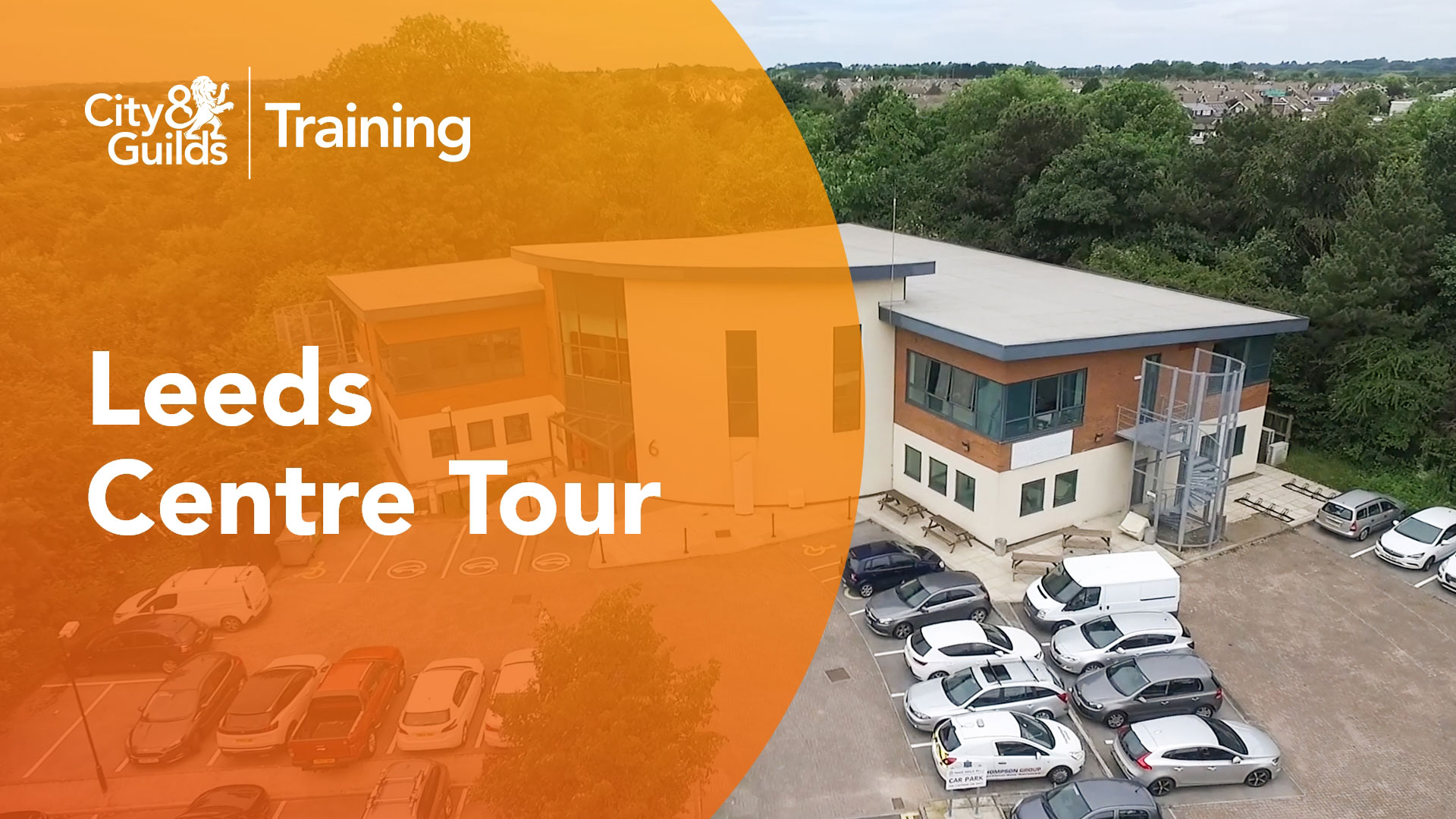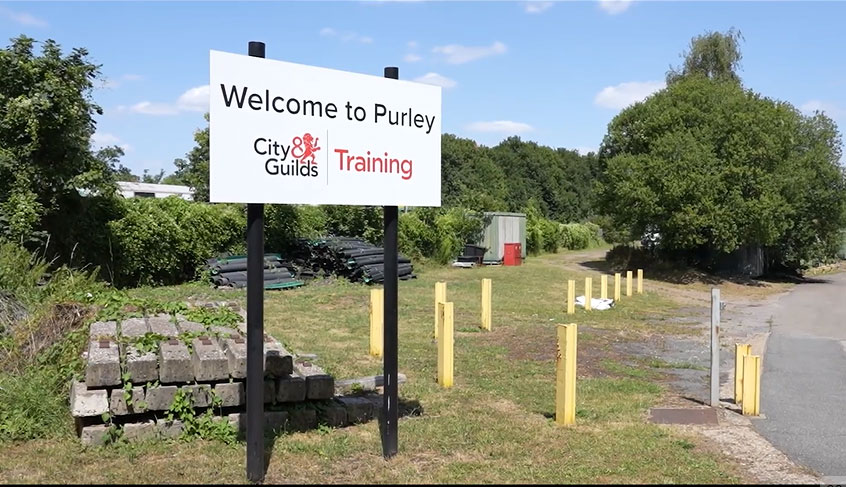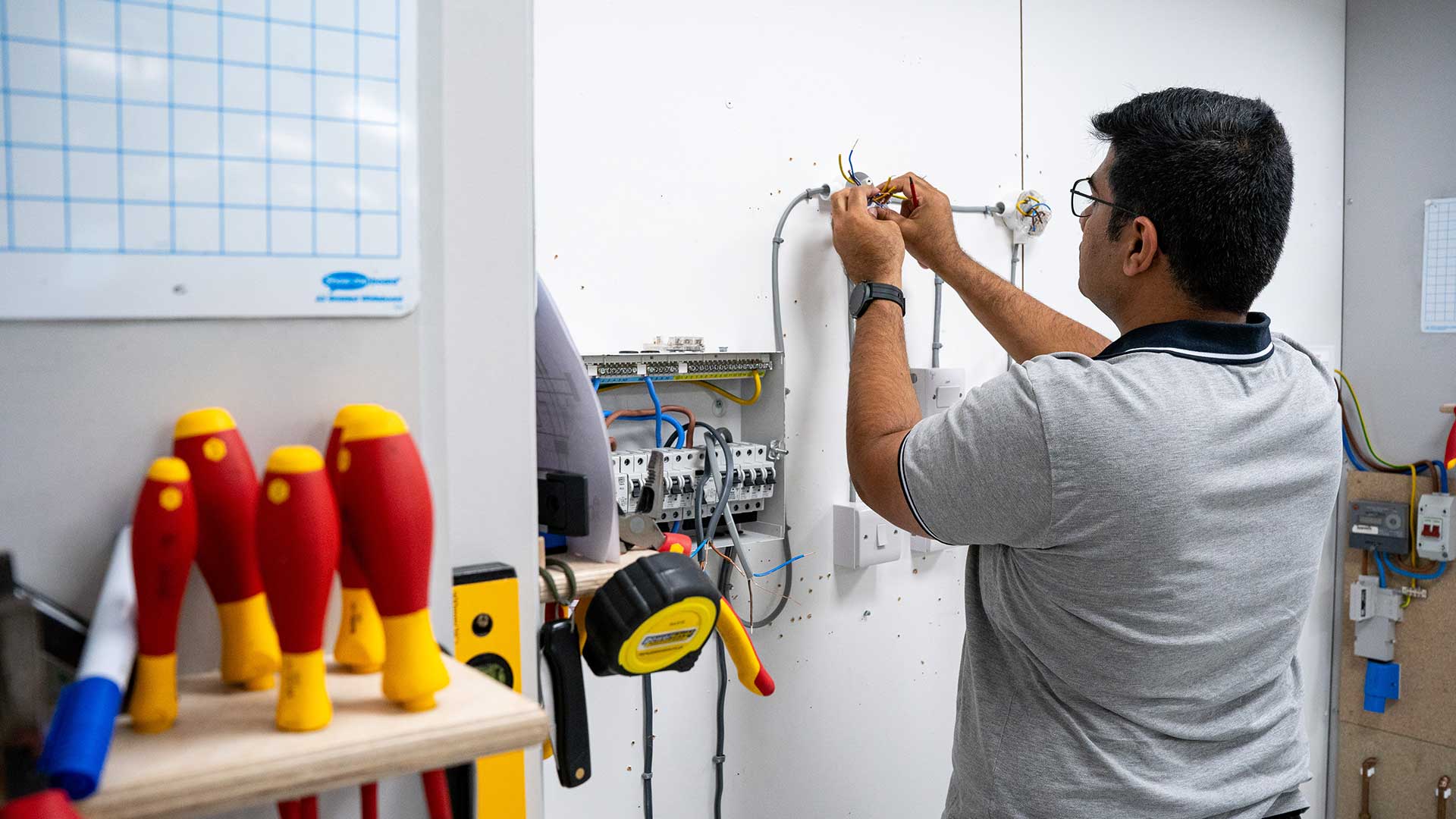Train at your convenience with electrical training courses delivered across evenings and virtual sessions.
CITY & GUILDS ELECTRICAL
How to Become an Electrician in the UK
If you’re interested in becoming a qualified electrician in the UK, there are no quick shortcuts. However, this page aims to simplify the process by providing information on industry-recognised routes and City & Guilds electrical qualifications. Whether you’re a new entrant or an experienced worker, these qualifications can help you achieve your goal of becoming a qualified electrician.
*Routes differ in Scotland and NI. More info is available on this page.
Apprenticeship Route
Key Information
To become an electrical apprentice, you will need to be employed in the electrical industry and be carrying out a suitable range of work to complete your portfolio of evidence. There are no upper-age limits to becoming an apprentice; it is never too late to learn!
 Apprenticeship Key Facts:
Apprenticeship Key Facts:
- You must be employed before you can enrol on an apprenticeship.
- The apprenticeship training programme typically takes around 4 years to complete.
- You do not pay for your training and will earn while you learn.
What We Offer
We offer two apprenticeships:
- Installation/Maintenance Electrician (Approx. 4 years)
- Domestic Electrician (Approx. 3 years)
Did You Know?
If you have already started your electrical training, you can swap to one of our apprenticeships at any point. For example, if you have completed a Level 3 Diploma and just need to complete NVQ Level 3, you can complete it as a funded apprentice.
Speak with our Apprenticeship Team to find out more
Diploma Route
The City & Guilds 2365 Diploma qualifications are designed for individuals who want to learn, develop, and practice the skills necessary for employment or career progression in the electrotechnology sector. These qualifications serve as a foundation for further progression toward becoming a fully qualified electrician.
This route is particularly popular with adult learners and career changers who are eager to invest in their own training.
You can start this route without employment in the industry to kick start your training, however, to complete this route fully and become a qualified electrician, you will need to be working in the industry.

Steps to completing the Diploma Route
- Domestic Installation Workshop
- Commercial/Industrial Installation Workshops.
- Health and Safety
- Principles of Electrical Science
- Electrotech Theory
- Fundamental Inspection & Testing Workshop

- Electrical Systems Design
- Environmental Technologies
- Principles of Electrical Science
- Career Awareness
- Inspection & Testing Workshop
- Fault Finding Workshop

- Witness testimony
- Reflective accounts
- Photographic evidence
- Direct observation

- AM2 Assessment of Competence completed at an independent NET centre

Complete your Diploma, NVQ and AM2 to become a qualified electrician, eligible for an ECS Gold Card.



Experienced Worker Assessment
Who is this assessment for?
The Installation and Maintenance EWA is an assessment process against the industry standard – it is not a shortcut to qualified status. To be eligible for the assessment you should have:
- A minimum of 5 years experience in the electrical industry working across the range of electrical activities set out in the Skills Scan.
- At least a Level 2 electrical qualification
TO COMPLETE YOU WILL NEED TO
- Complete a Skills Scan via an initial assessment with a member of our team.
- Have an up-to-date Wiring Regulations qualification
- Have an Initial Verification Inspection and Testing Qualification such as the C&G 2391-52
- Complete the EWA Level 3 performance units
Achievement of the Installation & Maintenance Electrician EWA and its assessment of competence—the AM2E—meets the criteria for an ECS Installation or Maintenance Electrician gold card application. It will be recognised in the Electrotechnical Assessment Specification as equivalent to the Installation/Maintenance Electrician apprenticeship.
Who is this assessment for?
The Installation and Maintenance EWA is an assessment process against the industry standard – it is not a shortcut to qualified status. To be eligible for the assessment you should have:
- A minimum of 3 years experience in the electrical industry working across the range of electrical activities set out in the Skills Scan.
- At least a Level 2 electrical qualification
TO COMPLETE YOU WILL NEED TO
- Complete a Skills Scan via an initial assessment with a member of our team.
- Have an up-to-date Wiring Regulations qualification
- Have an Initial Verification Inspection and Testing Qualification such as the C&G 2391-52
- Complete the EWA Level 3 performance units
Achievement of the Installation & Maintenance Electrician EWA and its assessment of competence—the AM2ED—meets the criteria for an ECS Domestic Electrician gold card application. It will be recognised in the Electrotechnical Assessment Specification as equivalent to the Domestic Electrician apprenticeship.
Full-Time Education
If you are under the age of 19 and don’t have suitable employment for an apprenticeship, this classroom-based route will provide you with technical knowledge and some practical skills that you can gain at a college or training centre, with the potential for work experience or contact with employers. You’ll still need to get practical experience in the workplace before you can become a qualified electrician.
Generally, students aged 14-19 can receive funding for this route. If you are under 19 and are interested in this full-time route, you can contact your local college for more information.

Frequently Asked Questions
GET IN TOUCH
Firstly, let us point out, the knowledge and skills learned in both programmes are fundamentally the same. The differences between the two programmes are how they are delivered; the big difference is employment. To do an apprenticeship, you need a job before you can begin. However, you can start our Diploma Route qualifications without a job. The Diploma route is flexible, as it allows you to complete your training at your own pace. You will need to be working to complete the NVQ and AM2.
Our Diploma Route programme front-loads the technical training and you will complete your on-site assessments (portfolio) during your Level 3 NVQ when you are working and gaining experience, whereas an apprenticeship combines work experience with technical training and you will complete your on-site assessments as you progress.
There are no fast-track routes to becoming an electrician. There are ‘domestic installer’ schemes available from competent person schemes such as NICEIC and NAPIT, however, these are options for qualified electricians.
Many electricians choose to specialise in domestic installations only. If this is your preferred option and you have suitable employment you may wish to consider our Domestic Electrician Apprenticeship or domestic EWA, subject to eligibility.
This depends on the route you take. The ones we offer are:
Installation/Maintenance Electrician Apprenticeship
Domestic Electrician Apprenticeship
Diploma Route
- City and Guilds 2365 Level 2 and 3 Diploma in Electrical Installations
- City and Guilds 2357 NVQ in Electro-Technical Technology
Experienced Worker Assessment
Generally, an apprenticeship takes around 3-4 years. If you undertake the Diploma & NVQ route, the timescales can vary, but most people complete it in 2-3 years.
Electricians are the highest earners of all the trades. On average, an experienced electrician earns around £42,000 p/a.
Source: https://nationalcareers.service.gov.uk/job-profiles/electrician
There are many excellent reasons to become an electrician and join this ever-growing industry. Once you have your core skills and qualifications, there are so many areas to move into. It is an exciting and financially rewarding industry.
With experience, you could:
- become an electrical design engineer
- become a site or project manager
- set up your own business
- train apprentices or teach in further education
- Diversify to install green technologies such as solar, battery and EV charging points.
You can start your electrical training on our Diploma route, however, you will need to be employed to complete your training.
There are many areas you may wish to diversify into once you become an electrician including domestic, commercial and industrial. You may consider working with green technologies such as EV charging, solar PV, battery storage, smart homes, wind or heat pumps. You could also consider Periodic Inspection & Testing, electrical design or HVAC. The possibilities are endless!
You can start self-funding your training on our Diploma route. You will need suitable employment in the electrical industry to complete your NVQ and AM2.
If you find suitable employment at any point, you may wish to transfer to one of our funded apprenticeships to complete your training. For more information visit our apprenticeship page.
It’s best to reach out to reputable electrical contractors and employers, such as housing associations or builders.
When you enrol on one of our courses, you will have access to a job board, where you can find job notifications from the many employers we work with.
An NVQ is not a training programme, it is an assessment framework that assesses your skills in the workplace. When you have completed your portfolio, there is one last assessment known as an AM2 assessment, which is your final assessment of competency. The time taken to complete an NVQ can vary, but it can be completed much quicker if you have a lot of variety in your job.
Great news! You can now consider one of our bolt-on courses including:
- EV Charging (2921)
- Solar PV
- Energy Storage
- Inspection and Testing (2391)
- 2396 Electrical Design (2396)
- PAT Testing
To name just a few. Please browse our website for more information, or get in touch.
No. 🙂

 Back
Back

























